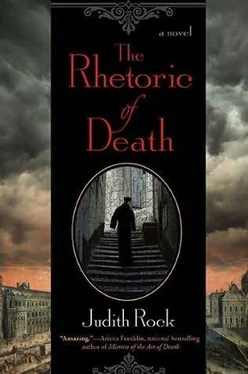Judith Rock - The Rhetoric of Death
Здесь есть возможность читать онлайн «Judith Rock - The Rhetoric of Death» весь текст электронной книги совершенно бесплатно (целиком полную версию без сокращений). В некоторых случаях можно слушать аудио, скачать через торрент в формате fb2 и присутствует краткое содержание. Жанр: Исторический детектив, на английском языке. Описание произведения, (предисловие) а так же отзывы посетителей доступны на портале библиотеки ЛибКат.
- Название:The Rhetoric of Death
- Автор:
- Жанр:
- Год:неизвестен
- ISBN:нет данных
- Рейтинг книги:3 / 5. Голосов: 1
-
Избранное:Добавить в избранное
- Отзывы:
-
Ваша оценка:
- 60
- 1
- 2
- 3
- 4
- 5
The Rhetoric of Death: краткое содержание, описание и аннотация
Предлагаем к чтению аннотацию, описание, краткое содержание или предисловие (зависит от того, что написал сам автор книги «The Rhetoric of Death»). Если вы не нашли необходимую информацию о книге — напишите в комментариях, мы постараемся отыскать её.
The Rhetoric of Death — читать онлайн бесплатно полную книгу (весь текст) целиком
Ниже представлен текст книги, разбитый по страницам. Система сохранения места последней прочитанной страницы, позволяет с удобством читать онлайн бесплатно книгу «The Rhetoric of Death», без необходимости каждый раз заново искать на чём Вы остановились. Поставьте закладку, и сможете в любой момент перейти на страницу, на которой закончили чтение.
Интервал:
Закладка:
But his Jesuit life, in other respects, mostly suited him. He loved his church and its ancient ritual, revered its heroic saints, believed its shining promises. He liked teaching rhetoric, loved producing the ballets that went with it. He wanted to come as close to Love as a man could, wanted to reach God’s heart. Through all his Jesuit training, in the heat of every theological argument, his deepest certainty had remained unshaken: that the beginning and end of God was Love, Love beyond human grasp or measure. For him, that trumped all other arguments. For him, cruelty in God’s name was blasphemously wrong. It was as simple as that. And so, for him, nothing was simple now.
He wiped his sweating face on his cassock sleeve and squinted through the road dust at the northern horizon.
Chapter 1
JULY 22, 1686
Charles leaned at the open window, gazing hungrily at Paris spread before him. Not that he could see much more than the faint outline of roofs, it being the dark of the moon and the sky thick with clouds still spitting rain after a wet day.
A discordant concert of bells began, from the Carmelites, the Visitandines, the Jacobins, the abbeys of St.-Germain-des-Pres and St.-Genevieve, from Cluny, Port Royal, and all the other religious houses on and around St. Genevieve’s hill, marking the hour and calling monks and nuns to prayers. Midnight, and the twenty-second day of July about to begin. This new day would be his first day at the College of Louis le Grand, and he’d hardly prayed since the old day’s morning, hunched and shivering in the saddle as his hired horse splashed through the downpour and the last long miles to Paris. Jesuits lived together, but they weren’t cloistered and didn’t sing the daily offices in choir. Instead, they prayed them from their breviaries wherever they found themselves. Those at the scholastic level like himself weren’t required to say the offices but they were encouraged to do so, and as the bells ceased, Charles shut his eyes and murmured Matins’ opening psalm. But the approaching rumble of iron-shod wheels over cobbles scattered his silent words like blown leaves and he leaned farther out of the window to see what was happening. The smell preceding the dung cart up the hill enlightened him. And surprised him, too, because waste collectors-in places that had such amenities-usually came near daybreak. But this was Paris, everything was different. Everything seemed possible.
Below him, the small light of hand lanterns swung and flickered as a night watch squad passed, and a few candles burned in windows where Latin quarter scholars-the lucky ones who could afford candles-sat late over their books. Or over wine and argument, more likely, Charles thought, a little enviously. When he’d been a student in Carpentras, enjoying wine with his academic arguing had meant risking expulsion by climbing a wall and going to a tavern. Most arguments, and tavern wine, hadn’t been worth it. This quarter, however, named for the Latin that was still the language of academic life, not only teemed with colleges-secondary schools for boys-but had at its heart the University of Paris, where older students, at least, must have more freedom-even if the wine wasn’t any better. Prayers forgotten, Charles stayed at the window, unwilling to let the darkling city go from his sight.
This wasn’t his first time away from the south. But nothing-certainly not the little town of Carpentras, not even his two years in the army or his novitiate in bustling Avignon-had prepared Charles for Paris. The heavy rain on this last day of his journey had brought early dusk, and it was long past Compline and dark in earnest by the time he’d ridden past the embankment where the city walls and the St. Jacques gate had once stood and joined the scattering of people hurrying home on horseback and foot. Keeping a wary eye on the fast-moving, lantern-hung coaches and carts, he’d fumbled in his travel purse for coins to give the beggars following his horse in spite of the weather and the late hour. The city had closed around him and he’d welcomed her embrace.
Now, standing at the window, he felt as though the goddess Fortuna had picked him up by the scruff of the neck and set him down in ancient Athens or Rome. As though, at any moment, the revered ancients whose works he taught would gather under his window to study him, peering into his brain, his heart, his very soul, to see if he was still worthy to pass on their learning. Romans had lived where the College of Louis le Grand stood, just as they had in the countryside where he’d grown up. From the time he could walk, he’d climbed on their ruined statues and played around the broken fluted column leaning at one corner of his father’s olive grove. Part of a black-and-white mosaic plowed up in a field was tiled into his mother’s kitchen fireplace. The Romans’ ghostly presence had fired his imagination and helped to make him a teacher of Latin rhetoric. So strong was his sudden sense of their presence here on the hill they’d called Lutetia, that he stood up straight and smoothed his cassock. But it was the reeking cart and its pair of muttering attendants that stood below him in the street, not Cicero and the rest. Laughing at his foolishness, he reached to pull the window shut, but before he closed it, he kissed his hand to sleeping Paris.
He latched the casement, glad for its glass against the night’s unseasonable chill, and closed the plain wooden shutter over it. These two little rooms were the first he’d ever had with glassed windows, since most windows in the warmer south-except in churches and grand houses-were still made of oiled paper. He turned to survey his chamber. Its roughly plastered white walls held a narrow, uncurtained bed, a backed but uncushioned chair, an age-blackened wooden chest for his linen, a hanging rail for his cassock, and a small oak table against one wall. A candle stood on a three-legged stool beside the bed and a couple of nichelike plaster shelves were built into the thick walls. The low, massive ceiling beams weighed on the small space, and he fought the urge to crouch as he went to trim his guttering candle’s wick. Neither the chamber nor the even smaller adjoining study had a fireplace, and he was too cold for the fumbling process of finding his flint and tinder in the dark and relighting the candle.
He shed his cassock, riding breeches, shoes, and stockings and stood in his long linen shirt eyeing the bed’s thin brown blanket. His woolen cloak was still wet, so he spread his cassock on top of the blankets, stirring the candle flame and sending shadows winging out from the crucifix hanging at the foot of the bed. He knelt, said the night prayers, gave thanks for his safe journey and this new assignment, and added prayers for Pernelle and her family. Surely, in the two months since he parted from them, they had reached Geneva. Let her-let all of them-be safe, he whispered, leaning his head on his clasped hands. Then he blew out the candle and slid between the coarse and worn flax sheets.
He woke to freezing feet and the clamor of bells. Peering blearily over the covers, he saw that his feet had neither mattress under them nor blanket over them. A common occurrence and his mother’s fault. His maternal forebears were the Norsemen who’d swept down from the Viking lands long ago to leave their name to Normandy, and their blondness and long bones to future generations. Charles was still gathering his sleep-sodden wits for morning prayers and rubbing one foot against the other for warmth, when a sharp rap at the door made him draw his feet out of sight like a startled turtle.
“Still sleeping, I see.”The lay brother sent the door bouncing back against the wall. He set a tray on the table and flung open shutter and casement to a flood of morning light that turned his red hair to a shock of flame. Charles grimaced. The light was as accusatory as the brother’s voice. It was obviously long past five o’clock, the normal rising time in a Jesuit college.
Читать дальшеИнтервал:
Закладка:
Похожие книги на «The Rhetoric of Death»
Представляем Вашему вниманию похожие книги на «The Rhetoric of Death» списком для выбора. Мы отобрали схожую по названию и смыслу литературу в надежде предоставить читателям больше вариантов отыскать новые, интересные, ещё непрочитанные произведения.
Обсуждение, отзывы о книге «The Rhetoric of Death» и просто собственные мнения читателей. Оставьте ваши комментарии, напишите, что Вы думаете о произведении, его смысле или главных героях. Укажите что конкретно понравилось, а что нет, и почему Вы так считаете.












